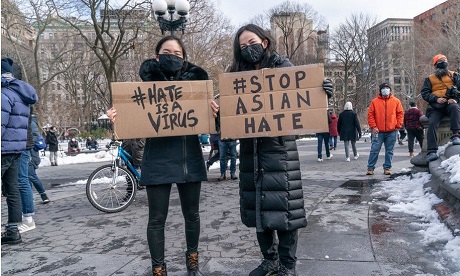Anti-Asian hate crimes targeting Asian Americans rose 150 percent in America’s largest cities last year.
At the same time, overall hate crimes decreased, according to new data from the Center for the Study of Hate and Extremism at California State University.
There were 122 hate crimes targeting Asian Americans in 16 of the country’s most populous cities in 2020, a study of police records shows, the study found.
This compares with 49 such crimes in those cities in 2019.
The first spike in anti-Asian hate crimes occurred last March and April, “amidst a rise in COVID cases and negative stereotyping of Asians relating to the pandemic.”
New York City saw the biggest increase. It recorded 28 hate crimes in 2020 compared to three in 2019 — an 833 percent jump.
Other cities with large increases included Philadelphia and Cleveland (200 percent increases) and Boston and Los Angeles (increases of over 110 percent).
These spikes occurred even as overall hate crimes in those cities fell seven percent – a drop likely caused by pandemic lockdown measures, the study found.
The study is seen as a reliable predictor of annual FBI hate crime statistics for the whole country, released every November.
Brian Levin, executive director at the hate and extremism center, predicts when the FBI data for 2020 is released, it will show a “century-high” number of hate crimes targeting Asian Americans.
“For our Asian American friends and neighbors, this is similar to a post 9/11 time, similar to what we saw with Muslims and Arab Americans,” Levin said, referring to the increase in hate crimes targeting those groups after the Sept. 11, 2001, terror attacks.
Rep. Grace Meng (D-N.Y.), whose district in Queens has recently seen anti-Asian hate crimes, says racist rhetoric and misinformation from public officials is to blame.
“We saw discriminatory rhetoric coming from President Trump and Members of Congress including from the highest-ranking Republican in the House,” Meng said.
“Although Donald Trump is no longer in office, his past anti-Asian rhetoric and use of terms like ‘Chinese virus’ and ‘Kung-flu’ continues to threaten the safety of the Asian American community. So many Asian Americans” are currently “living in fear.”
This hate and fearmongering is another chapter in a long history of racism, nativism and xenophobia against Asian Americans, beginning in the 19th century, when Asian immigrants were deemed “the yellow peril” and accused of being filthy disease carriers, Meng said.
Throughout the pandemic, Asian American and Pacific Islander advocacy groups and local governments recorded sharp upticks in anti-Asian racist attacks and harassment.
In recent weeks, there has been a wave of high-profile incidents, including in New York City and the San Francisco Bay Area, both with large and robust Asian American communities. Many of the attacks have involved older Asian Americans.
In one of his first acts as president, Joe Biden condemned anti-Asian racism and pledged to take more action. The Department of Justice has said it will devote more resources to investigating such incidents.
Source
- Huffington Post
- Images: BBC
